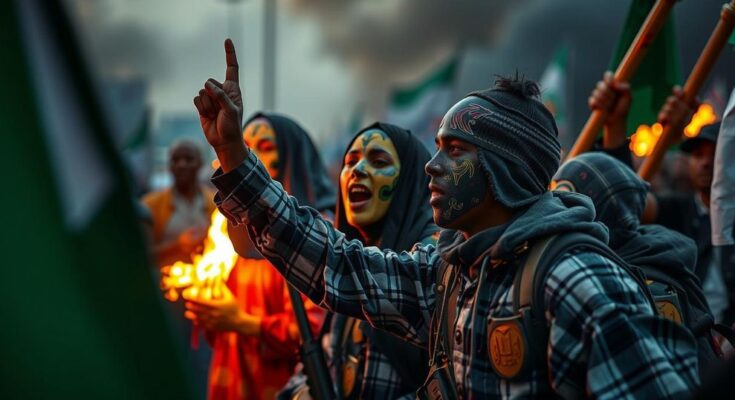Rights organizations are pressing the Nigerian government to release minors charged for participating in protests against rising living costs. Disturbing scenes of young detainees fainting in court have sparked public outcry. With charges ranging from treason to public disturbance, and calls from human rights advocates for their immediate release, the situation underscores Nigeria’s broader economic discontent that has spurred recent protests.
Amid growing anxiety, rights organizations are urging the Nigerian government to release minors who were charged after participating in protests against escalating living costs. The mounting tension followed reports of young detainees fainting in court, prompting widespread outrage among politicians and civil rights advocates. Recently, 76 individuals, including 30 minors aged 14 to 17, were presented before the courts, facing serious charges including treason and public disturbance, stemming from protests launched in response to the nation’s economic turmoil. Conditions within the detention facilities have drawn sharp criticism, with lawmakers and civil society expressing concern for the wellbeing of the young defendants who have endured three months of captivity. Images from Abuja’s court revealed minors visibly struggling, some collapsing from exhaustion, which intensified calls for their release. “These children are suffering for merely voicing their frustrations against hunger and corruption,” remarked Peter Obi, a former presidential candidate. In a stark response, Amnesty International labeled the arrests as a grave violation of assembly rights, condemning it as one of the worst attempts to suppress public dissent in recent times. Meanwhile, the police refuted allegations of mistreatment, insisting medical assistance was provided to detainees, stating, “age does not exempt individuals from facing legal consequences.” The minors have since secured bail, with trial proceedings slated for January. In light of the situation, the Socio-Economic Rights and Accountability Project voiced its concerns, urging President Bola Tinubu to release the detained youths promptly, stating, “These children are incarcerated solely for the peaceful exercise of their human rights.” Additionally, there are reports that the Minister of Justice is moving to have the charges against these minors dropped. This incident sheds light on the larger context of unrest in Nigeria, driven by frustrations over living conditions, which have sparked violent protests resulting in fatalities and numerous arrests.
The current crisis in Nigeria has illuminated the struggles faced by its youth, primarily stemming from economic challenges that have prompted protests. Discontent over high living costs has led to widespread demonstrations, with authorities cracking down on dissent. The detention and severe legal repercussions faced by the minors reflect broader societal tensions and human rights concerns regarding freedom of expression and assembly.
The detention of minors for protesting against high living costs in Nigeria has ignited public outrage and calls for their immediate release. Human rights groups emphasize that these children should not face severe legal punishments for exercising their rights to peaceful assembly. As the government considers dropping the charges, the ongoing protests highlight the urgent need for addressing economic grievances to restore stability.
Original Source: www.aljazeera.com



